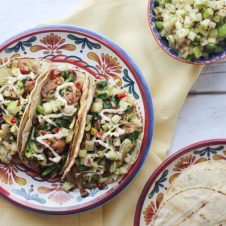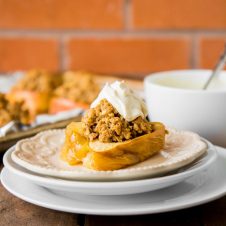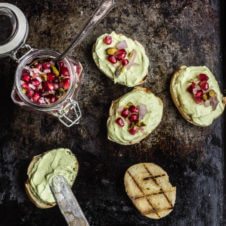Fermented foods have been used for centuries by cultures all over the world and now they’re making a serious comeback. Pickled, fermented, and preserved foods are showing up on the best menus, being touted as superfoods, and receiving praise from a wide range of food and nutrition experts. But what’s so great about the humble pickle? Aside from allowing us to enjoy foods during all seasons and adding a distinct delicious flavor, fermentation offers the benefits of probiotics!
What the Heck is Fermentation?
Fermentation is the chemical breakdown of a food product by converting sugars to acids, gases, and alcohol. Thanks to this process and the bacteria that make it possible, we get yummy foods like yogurt, olives, sauerkraut, kefir, pickles, miso, tempeh, tofu, kimchi, kombucha, sour cream, beer and wine. We also get probiotics or ‘good’ bacteria, which are responsible for exerting all the health benefits. Not sold by the idea of eating bacteria? No need to fear, our digestive systems are already filled with all kinds of creepy crawlers, so the more good bacteria we consume, the more our bodies can use it to keep us healthy.
What are the Benefits of Probiotics?
As always, research is ongoing in this expanding field, but here’s a quick roundup of some of the benefits of probiotics:
1) Bacteria present in fermented foods can help alleviate symptoms of lactose intolerance through their galactosidase activity (that’s the enzyme missing in those with lactose intolerance). Also, fermented dairy products like yogurt and kefir have lower lactose contents, allowing those with lactose intolerance to enjoy them in small amounts. They also have higher concentrations of vitamins such as B12, K, folate and riboflavin- bonus!
2) Preliminary research has shown that probiotics can lower serum cholesterol and blood pressure, therefore helping reduce risk of cardiovascular disease. How this happens is still not clear and more research is needed.
3) Since the intestinal tract has such a large role in the immune system, filling the gut with helpful bacteria helps regulate immunity.
4) Probiotics can be used to treat inflammation as a result of inflammatory bowel disease or inflammatory bowel syndrome (IBS).
5) Fermented foods are often easier to digest because the fermentation process breaks down compounds referred to as ‘anti-nutrients,’ which humans cannot easily breakdown themselves.
6) Fermented foods have been found to alleviate constipation and keep things moving smoothly.
7) When good bacteria binds to the urinary and intestinal tract, there’s less space for bad bacteria to do so, preventing bacteria such as E. coli from colonizing in the body.
Now you know the benefits of probiotics. I’m sure you know how to sip wine and snack on pickles, but what are you supposed to do with miso, kombucha and tempeh?! I’ve got you covered. Here are some great recipes to get you started with fermented foods:
Best Fermented Foods
Love & Lemons – Ginger Kombucha Cocktail
Oh My Veggies – Mango Tempeh Lettuce Wraps
Sprouted Kitchen Miso Slaw with Tofu
The Colorful Kitchen Sauerkraut Kale Chips
Smitten Kitchen Swirled Berry Yogurt Pops
Smitten Kitchen Roasted Asparagus with Almonds and Yogurt Dressing
Ready for another bonus? Making your own preserved and canned foods is a simple task you can do in your own kitchen. In fact, it may be a better idea since many commercial products are not actually fermented but rather, just doused in vinegar. Also, a lot of commercial food safety practices have the potential to kill all that beneficial bacteria. There are many types of fermentation, but the basic recipe for preserved foods is to completely submerge (no air!) any vegetable or fruit in salty brine with your choice of seasonings, seal the jar and let it sit. Other fermented foods like yogurt and kombucha require a starter culture, which you can buy, or just use some of the existing product to start off the process. Here are some DIY fermentation recipes to bring out your inner food chemist:
My New Roots – Kimchi
Live Simply – Homemade Crockpot Yogurt
Love and Lemons – Any Vegetable Pickles
Live Simply – Berry Lemonade Kombucha
Natasha’s Kitchen – Sauerkraut
Are you convinced by the benefits of probiotics? Have you ever tried your own home fermenting? Leave me a comment and tell me about your favorite fermented foods!
Contribution by AK Taster: Olivia Cupido
Updated on May 8th, 2019

Abbey Sharp is a Registered Dietitian (RD), regulated by the Ontario College of Dietitians. She is a mom, YouTuber, Blogger, award winning cookbook author, media coach specializing in food and nutrition influencers, and a frequent contributor to national publications like Healthline and on national broadcast TV shows.




Abby says
personally haven’t tried to make fermented food yet. But after your great article will ask my granny to show me in live how to do that! Thanks author.
Abbey Sharp says
Great plan! Thanks
Danielle Cushing says
Thanks for all the info Abbey! Fermentation scares people away, but the recipes and pictures you chose look so yummy — I’ll have to try my hand at it!
Rebecca P. says
All the goodies!! Sauerkraut is my fav 😉
Abbey Sharp says
I’m in love w it too
Liz_MealMakeoverMom says
Wow. What a roundup. Thanks for the great tutorial too on good bacteria 🙂
Abbey Sharp says
Thanks Liz! It’s important stuff!
Athletic Avocado says
awesome round up! I need to try my hand at making some fermented foods!
Abbey Sharp says
Yes!! Kimchi party!
Terri Baker says
So many fantastic recipes! I am going to try the Smitten Kitchen Roasted Asparagus with Almonds and Yogurt Dressing
Abbey Sharp says
Looks amazing eh?